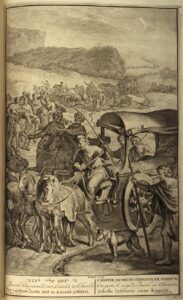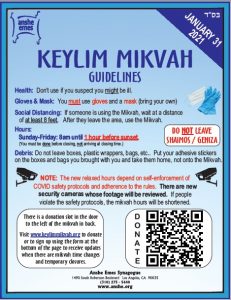A. Summary
1. Yoseph’s Promise; Yoseph visits Yaakov on his deathbed. Yaakov, then 147 years old and near death, sent for Yoseph and made him promise that he would bury him in Canaan (the resting place of his fathers), rather than in Egypt. Sometime later, Yoseph was informed that Yaakov was ill and went, along with his sons Ephrayim and Menasheh, to visit him.
2. Yaakov blesses Ephrayim and Menasheh. Yaakov told Yoseph that Ephrayim and Menasheh would be counted among Yaakov’s own sons and would each head a Tribe. Yaakov kissed, hugged and brought close to bless Ephrayim and Menasheh, placing his right hand on Ephrayim (the younger) and his left hand on Menasheh (the elder). Yoseph thought that Yaakov had mistakenly reversed the order of his hands and tried to correct them. However, Yaakov refused to change the position of his hands, predicting that while Menasheh’s descendants would be great, Ephrayim’s would be even greater.
3. “Birchas Yaakov” (The Blessings of Yaakov). Yaakov called each of his sons to his bedside, blessed them, prophesied about each Tribe’s future and described each Tribe’s special attributes and characteristics.
4. Yaakov Dies. After instructing his sons to bury him in the Cave of Machpelah, Yaakov went to his bed and “returned to his people”.
5. Yaakov Is Buried. Yoseph fell upon Yaakov’s face and wept. The Egyptians mourned Yaakov’s death for seventy days. With Pharaoh’s permission, Yaakov, along with his brothers and their households and the elders of Egypt, returned to Canaan to bury Yaakov in the Cave of Machpelah.
6. Yoseph Reassures His Brothers. On the return trip to Egypt, Yoseph’s brothers feared that, now that Yaakov was dead, Yoseph would seek retribution and so they sought his pardon. Yoseph reassured them that he would not seek revenge, assuring them that he would continue to support them and their children.
7. Yoseph Dies. Before Yoseph’s death, Yoseph made the Children of Israel promise to take along his remains with them when Hashem returned them to Israel. Yoseph died at 110 and was placed in a coffin in Egypt.
B. Divrei Torah
1. Lilmode Ul’Lamed (Rabbi Mordechai Katz)
a. “And He Lived”. Why isn’t the word “death” used in connection with Yaakov? In fact, the Parsha, which recounts Yaakov’s death, is entitled “Vayechi” (“and he lived”). Taanis 56 teaches that there are two deaths — a physical death and the end of one’s influence and impact on the world. For many people, the two are simultaneous. However, in Yaakov’s case, he accomplished so much during his lifetime that his influence and impact survive even to this day. We should strive to accomplish something worthwhile during our lives so that our achievements will live on.
b. Ephrayim and Menasheh. Ephrayim and Menasheh were singled out during the blessing of the sons for two reasons: (a) they were the only members of Yaakov’s family born in “golus” (exile); despite the competing temptations of golus, they remained true to Hashem’s principles; (b) they are emulated for their lack of envy for each other (e.g., Menasheh was not jealous that Ephrayim received a greater blessing).
c. “Achdus” (Unity). The Ari HaKodesh comments that when the two “yuds” of Hashem’s name are written together, the letters can’t be erased. However, if one “yud” is higher than the other, it is not the name of Hashem and can be erased. The reason for this is that the two “yuds” must not be rivals and must consider themselves equal; only then do they symbolize Hashem. Similarly, two Jews can evoke Hashem’s spirituality only when they work together harmoniously, and not when one considers himself above the other. Egotism leads to destruction and rivalry and hatred can only cause the downfall of B’nai Yisroel. It is when Jews are united and accept each other as equals that B’nai Yisroel can thrive and flourish, and bring credit to Hashem and His Torah.
2. In the Garden Of The Torah (the Lubavitcher Rebbe, Rabbi Menachem M. Schneerson, z’tl)
a. Light In Darkness. Why were Yaakov’s best years spent in Egypt, not Canaan?: (i) the Alter Rebbe, z’tl notes that even before Yaakov arrived in Egypt, he sent Yehudah ahead to Egypt to establish a yeshivah; when one studies Torah, one comes closer to Hashem, allowing one to live with true and genuine vitality, even in Egypt; (ii) the thrust of Yaakov’s life was to draw close to Hashem through Torah study; yet, he didn’t stay in the tents of Shem and Even (the leading house of study in Canaan) — rather, his life encompassed a variety of circumstances and challenges, allowing him the opportunity to prove that the connection he established through Torah study was genuine; and (iii) not only did Yaakov study, but he involved his children and grandchildren and was thus able to extend the holy atmosphere of Canaan to Egypt.
b. Yaakov Still Lives in Each of Us. Yaakov’s connection to Hashem was perpectuated beyond his mortal lifetime. Regardless of one’s conduct or level of observance, every person remains a Jew and shares a connection to the entire Torah and Yaakov’s spiritual legacy. As the Torah teaches, “the Torah which Moshe commanded us is the heritage of the congregation’ of Yaakov”. This is Shabbos Chazak (the “Shabbos of Reinforcement”) since we declare “Chazak, Chazak, Vinischazaik” (“be strong, be strong and may you be strengthened”) as we complete Beresheis. Through the awareness nurtured by this Parsha — i.e., that we all have been granted a heritage of life expressed through a connection with the Torah, and that there will come a time when this connection will blossom — we can acquire the inner strength to confront our challenges.
3. Growth Through Torah (Rabbi Zelig Pliskin)
a. Unity creates love and love creates forgiveness. Yaakov called his sons together to achieve “Achdus” (“unity”). Only when there is unity among the descendants of Yaakov can there be redemption.
b. Work to not act impulsively. Yaakov told Reuven that he was “unstable as water and would not have pre-eminence”. The Torah’s metaphor shows us that, just as water flows quickly, so is the behavior of someone who acts impulsively. If we don’t weigh the consequences of our behavior, we can make many harmful mistakes and cause much damage.
c. All traits must be utilized in appropriate amounts. In talking about Shimon and Levi, Yaakov said “I will divide them among the rest of Yaakov and spread them among Israel”. The Chasam Sofer explains that while Shimon and Levi overreacted with violence for Dinah’s benefit, the other brothers did nothing. By “spreading out” their anger among the other brothers, Yaakov was ensuring that they would all have this trait in the proper amount. To be a complete person, every trait must be used, although we must look to the Torah to clarify the right time, place and amount for each trait.
d. Power over oneself is real power. Yaakov said: “Yehudah is a lion’s whelp, from the prey, my son, you have gone up.” Rashi notes that Yehudah elevated himself in two ways — by stopping his brothers from killing Yoseph and by publicly embarrassing himself to save Tamar. Rabbi Yeruschem Levovitz cites the Kuzari that righteous is one who rules over himself and his impulses; such a person is worthy of being a ruler over others, because he will rule with the same righteousness with which he rules himself, and is why Yehudah merited being the Tribe of the future Kings of Israel (and Moschiach).
e. True peace of mind comes from being able to accept all circumstances. About Yissachar, Yaakov said: “And he saw that rest was good, and the land that it was pleasant, and he bowed his shoulders to bear.” Why was the Torah given at Mt. Sinai (in the wilderness) and not in the calm and peacefulness of Israel? Rabbi Levovitz noted that this is teach us that true peace mind — the state in which one must be to accept and study Torah — doesn’t come from physical comforts, but from an awareness of one’s ultimate life goals. When you focus on this, you are constantly traveling toward your goal and will never be overly disturbed or broken. Yissachar, the Tribe devoted to Torah study, “bowed his shoulders to bear” — i.e., by training himself to bear any difficulties, he was able to reach the highest level of peace of mind in all situations.
4. Love Thy Neighbor (Rabbi Zelig Pliskin)
a. True kindness is helping someone without any ulterior motive. Yaakov told his sons “If I have found favor in your eyes . . . seal me with kindness and truth and bury me not in Egypt”. Rashi comments that kindness to the dead is true kindness, for one who does such kindness doesn’t look forward to any payment. Whenever we do something for others, we should emulate this kindness and have their, not our own, benefit in mind.
b. Smile at others. Yaakov blessed Yehudah that “your eyes will be red with wine and your teeth white with milk” (i.e., the land will be fertile so that it would produce an abundance of wine and milk). The Talmud teaches that “teeth white with milk” can be read to mean that when one shows his teeth (by smiling) to another, it is better than giving him milk; while milk nourishes the body, a smile enters the mind and body.
5. Kol Dodi on the Torah (Rabbi David Feinstein)
Soliciting Hashem’s Help. Why does the blessing of the sons state that Hashem should “make you like Ephrayim and Menasheh”, rather than may you “grow up” (i.e., work hard on your own) to become like Ephrayim and Menasheh? Chazel teach that even the most righteous person needs help from Heaven in overflowing measure. For example, if someone decides not to keep his store open on Shabbos, he must make that decision himself. He can, however, ask Hashem to make it easier (e.g., to send him more customers during the week). This principle teaches us the intent of the blessing which Yaakov suggested for his descendants. In the blessing of the children, we aren’t asking that Hashem “make” our children into righteous people since this can only be accomplished through their own hard work; rather, we are asking that Hashem help them in whatever ways He can, operating through the natural processes of the world. The fact that Ephrayim and Menasheh — who grew up in conditions least favorable for spiritual greatness — grew up to be such righteous people shows that Hashem must have given them more than the usual help to achieve their aspirations, a wish we have for our children.
6. Majesty of Man (Rabbi A. Henach Leibowitz)
Making The Impossible Achievable. Why did Yaakov make Yoseph make an oath that he wouldn’t allow him to be buried in Egypt? Ramban teaches that if Pharaoh would have prohibited his burial in Canaan, Yoseph’s oath would have given him the extra strength to defy Pharaoh. If we focus on the impact of our actions (e.g., on our visiting a hospital patient, giving charity, etc.), it will imbue us with strength to do “chesed” (kindness) and mitzvos which we previously thought was beyond our capacity.
7. Artscroll Chumash
A Note on the Shema. Rashi comments that Yaakov wished to tell his children when Moshiach would come (presumably to comfort them and their descendants during time of exile), but the Divine Presence deserted him. At first, he thought that it was because his children were unworthy, but when he asked them and they responded with the Shema, he exclaimed in gratitude “Baruch Shem Kavod . . . ” (the portion of the Shema which we ordinarily say under our breath).
8. D’rash Moshe (Rav Moshe Feinstein, z’tl)
Accepting the Oral Law. And Yoseph said to his brothers, “I am about to die, but G-d will surely remember you and bring you up out of this land that He promised an oath to Abraham, to Yitzchak and to Yaakov.” Then Yoseph adjured the Children of Israel, saying, “when G-d will indeed remember you, you must bring my bones out of here.” Rashi notes that in the first verse, Yoseph said that he heard from Yaakov, and in the second verse he said that the same thing happened in his own name. First he handed down the tradition he received from Yaakov and then he said it himself. It seems that the tradition emanated only from Yaakov, but Rashi in Shemos states clearly that the tradition came from both Yaakov and Yoseph. What exactly was Yoseph’s role in the tradition? These verses teach us a fundamental lesson in the faith we must have in the words of the Prophets and in the sayings of our Sages, both of which are Divinely inspired. Anything we receive from these sources must be accepted with complete faith, as if we had seen and heard it spoken directly from Hashem Himself, not merely as words transmitted by our father. Thus, even though Hashem’s promise to Yaakov to redeem the Jews from Egypt, a prophecy, was only a received tradition as far as Yoseph was concerned, he nonetheless said it to his brothers in his own name as if he himself had heard it directly from Hashem. To give an example of what this means to us, the Sages said (in Sotah 2a) that forty days before the formation of the embryo, a heavenly voice announces that “so-and-so’s daughter is destined for so-and-so”. Once someone has married, then he or she must believe that Hashem intended their spouse specifically for them with as much unequivocal faith as if he or she had heard the heavenly proclamation his/herself. If this faith is indeed that clear, and he/she doesn’t feel that the marriage was the result of coincidence, then he/she and his/her spouse will live harmoniously all of their lives, for Hashem’s word is meant only for good and blessing. This example highlights the importance of accepting the words of our Sages as if we ourselves had heard them directly from Hashem.
9. The Chasem Sofer on Beresheis
a. Yaakov’s Blessing of Yoseph. “And he blessed Yoseph and he said, Oh G-d before whom my forefathers Abraham and Yitzchak walked — G-d who shepherds me from my inception to this day — may the Angel who redeems me from all evil bless the lads and may my name be declared upon them and the names of my forefathers Abraham and Yitzchak and may they proliferate abundantly like fish within the land.” The Chasem Sofer notes that while seeming to bless Yoseph, Yaakov in reality blessed Yoseph’s children. This reminds us of the beautiful Aggadah in which Rabbi Yitzchak, having enjoyed the shades of a tree, sought to bless it. Since the tree was already blessed with Hashem’s bounty, he could only bestow upon it a wish: may your seed be like you. Similarly, Yoseph, blessed with all of his heart’s desires, was granted the baracha that his children follow in his path. The phrase “and may my name be declared upon name” may express Yaakov’s most sublime wish: just as I merited to have to have as worthy son as you, so may your children enjoy such outstanding children.
b. When will the Messianic Era Occur? Then Yaakov called for his sons and said, “Assemble yourselves and I will tell you what will behalf you in the End of Days. Gather yourselves and listen, Oh Sons of Yaakov, and listen to Yaakov your father.” While many assert that these words describe how Yaakov saw — but failed to reveal — when Moschiach would come, these verses reveal the conditions necessary for His arrival: (a) “Gather!” Unite, rather than resorting to endless factionalization; (b) Even if you are crushed by the fear of relentless persecutions — even if it takes a Haman to make you repent — your repentance will precipitate the coming of Moschiach; and (c) the name “Yisroel” connotes a triumphant people, doing teshuvah not out of fear, but out of a sincere desire to return to Hashem. Any of these factors will produce the End of Days!
10. Living Each Day (Rabbi Abraham Twerski)
Character refinement by faith. Yoseph said to his brothers: “Am I in place of G-d? You intended to harm me, but it was G-d’s intention that your actions turned out favorably.” In Vayishlach, we discussed that changing one’s character is difficult, if not impossible, without Torah, prayer and Divine assistance. It is much like the futility of being in a dark room and trying to drive the darkness out the window. If, however, you just light a candle, the darkness will disappear on its own. If one if diligent in Torah, prayer and connecting to Hashem, undesirable character traits can be removed. In this week’s Parsha, Yoseph’s brothers, following their father’s death, are nervous that Yoseph will now take revenge for their having previously sold him into slavery. Yoseph responds by assuring them that he has no intention of seeking revenge: “Am I in place of G-d,” he asked. Note that Yoseph does not say, “I will forgive you.” Rather, he points out how powerless he is to take revenge; hence, he has no intention of doing so. Is it not obvious, he asks, that we can not determine the outcome of our actions? What sense does it make for me to try to punish you? If it is the Divine Will that you will be spared from punishment, then all of my efforts will be in vain, just as your efforts to harm me were all in vain. Yoseph does not profess to be a saint who sets aside his deep resentment and be magnanimous in granting forgiveness. Rather, he dismisses seeking revenge as a useless act, because he considers revenge to be a futile feeling. That which G-d intends will come about regardless of our efforts to bring it about or prevent it. That is the ideal approach to ridding ourselves of undesirable traits. We must realize that we don’t control the world and that G-d does. The verse “You shall not take revenge” can also be correctly translated as “You can not take revenge.” It is simply out of our hands to make things happen. This is how undesirable traits — envy, greed, lust, vanity, etc. — should be eliminated. We need only know that what is intended to be will be, and that we are not intended to have we can not attain regardless of how much effort we exert. With proper faith in Hashem, everything will fall into proper place.
11. Reflections on the Sedra (Rabbi Zalman I. Posner).
Keys To Survival. Jacob, feeling his death imminent, summoned his sons and said “come together and listen, sons of Jacob, and listen to Israel your father.” “Come together” and “listen to Israel your father” are the dual keys to the survivial of the Jewish people. Factionalism is a luxury Jews cannot afford. G-d chose the entire Jewish people, not just certain segments of us. The second part of the verse, “listen to Israel your father,” reminds us that the true source of strength throughout our history has been that of the Torah and our faith in G-d.
12. Soul of the Torah: Insights Of the Chassidic Masters on the Weekly Torah Portions (Victor Cohen).
a. “And He Lived” While the Parsha is entitled Vayechi (“And He Lived”), it really speaks of Jacob’s death. The Lubavitcher Rebbe, z’tl noted that Jacob’s life was one of connection to G-d that transcended the material world. Since he shared this quality with his descendants, he was perpetuated beyond his mortal lifetime.
b. An Enduring Legacy. “Jacob our father did not die.” The S’fas Emes noted that when a child continues in his parents footsteps, it cannot be said that the parent has died. R’ Yisroel Modzitzer remaked that the statement “the house of Jacob is afire” means that in every Jewish heart there is a spark of the Divine. Of this spark, our Sages declared, “Jacob, our father, is not dead.” This flame would never be extinguished.
c. Daily Appreciation. “So he blessed them that day.” The Lenchener commented that Jacob blessed Yoseph’s children that they ought to bless and thank G-d for today and never worry about the morrow.
d. The Power of Prayer. “With my sword and with my bow”. The Kotzker commented that prayer is likened to a bow. The more one stretches a bow, the farther and higher the arrow goes. The same is true with prayer – the more we concentrate with Kavanah (deep feeling, the farther and higher it will reach.
e. Being United. “Gather yourselves and listen.” The Mishmeres Itmer said that when we are united and remain close with one another, then G-d will listen to us.
f. A Lesson In Patience. “And he saw a resting place, and that it was good . . . and he bent his shoulder to bear.” The Lubliner Rebbe noted that Jacob’s blessing to Issacher reflected Issacher’s ability to live in peace and harmony with his neighbors because “he bent his shoulder to bear.” That is, he learned to bend his shoulder, to let things go, and never to get involved with someone’s anger and manipulative behavior. On the same verse, R’ Bunim commented that when we desire release from worries, we can obtain it by bending our shoulders to anything that might befall us. By so doing, we can be spiritually satisfied no matter what the outcome.
13. Living Each Week (Rabbi Avraham Twerski).
a. Living Each Day. “He [Jacob] blessed them [Yoseph’s sons] on that day. . .” Of what significance is it that the blessing occurred on that day? The verse may be translated just a bit differently, to read “he blessed them with that day.” Jacob gave them a blessing that they live their lives on the particular day in which they find themselves, unencumbered by the burdens of the past or worries about the future. This is indeed a blessing. If we only channel our energies towards doing that which can be productive, instead of squandering them and trying to make yesterday better or worrying about possible future eventualities, how much happier we would be!
b. Avoidance of Envy. Why did Jacob single out Ephraim and Manasseh as the prototypes whom everyone would wish to emulate? Although Manasseh was the oldest of Yoseph’s two sons, Jacob had shown preference for the older Ephraim by placing his right hand on his head at the giving of the blessing. Although Yoseph objected, Manasseh bore it in silence. Upon seeing Manasseh’s reaction, Jacob said “let these two brothers be the examples for all Israel to follow.” When we see others who appear to have been given preferential treatment by G-d, let us remember the blessing of the Patriarch, and relate to his/her as Manasseh did to Ephraim.
c. Reinforce Positive Traits. “. . . everyone according to his blessing did he bless them.” Rashi explains that Jacob gave each tribe the blessing appropriate and specific for it, although he also gave them a comprehensive, inclusive blessing. Inasmuch as each tribe had its own particular strengths and talents, each received a blessing or stimulus to develop that dominant trait. Although there was also a comprehensive blessing, the emphasis was on the uniqueness of each tribe. Rabbi Yeruchem notes that this is the most effective formula for character development. Each of us has unique character traits which lend themselves more easily to perfection. It is these traits which should receive greatest emphasis, and which we should try to perfect. In the process of doing so, there will be a ripple effect, so that other traits of lesser dominance will also be perfected. This is undoubtedly what the wise Solomon meant when he said, “train the child according to his trend.” Character development may appear to be a formidable task, but it becomes much simpler if we begin with our natural tendencies which are more conducive to perfection. The self-confidence and reassurance that we will gain from doing so will facilitate the development of our other traits.
14. Vedibarta Bam (Rabbi Moshe Bogomilsky)
a. To Be Blessed As Fish. Why did Yaakov bless them to multiply as the fish of the ocean? Like the fish, which cannot survive outside water, we cannot survive outside our source of life, the Torah. Additionally, the life of a fish depends in large measure on its vitality and its ability to swim up stream; Yaakov blessed his children to be capable and willing to swim up stream and resist the temptation of swimming with the tide.
b. Righteous Children. “He blessed Yoseph saying. . . ‘ the angel who will redeem me from all evil should bless the lads [Menasheh and Ephraim].'” The Pasuk begins with Yaakov’s blessing to Yoseph and ends saying that he blessed Menasheh and Ephraim. What was the blessing for Yoseph? Yaakov’s blessing to Yoseph was that his children, Menasheh and Ephraim, should be righteous. When children conduct themselves in the proper way, the parents’ Nachas [joy] is the greatest blessing they for which they can wish.
c. Faith At All Times. “Assemble yourselves, and I will tell you what will befall you in the end of days. Yaakov gathered together his children and wanted to reveal the time of the coming of Moshiach. Suddenly, the Divine Presence left him. He began to worry, “maybe there is some fault in my children.” They immediately responded “Shema Yisrael, you believe in only one G-d and so do we.” Happily, Yaakov exclaimed “Blessed be the name of His glorious kingdom forever and ever.” What did Yaakov mean with this response? When a Jew finds himself in a troublesome situation, he oftens cries out “Shema Yisrael.” Yaakov was not surprised to hear his sons pronounce “Shema Yisrael” when they stood around his deathbed. However, he used the opportunity to convey an important legacy: “Do not express your absolute faith in Hashem only in times of anxiety and distress, but at all times and forever and ever. . .”
d. True Self Awareness. “And he blessed them; everyone according to his blessings, he blessed them.” Superficially, the words of “Yaakov to Reuven, Shimon and Levi appear to be rebukes rather than blessings. If so, how can we reconcile this with the above verse? We are mortal and thus subject to failure. We must work hard to overcome personal inperfection. Often, we do not realize, or refuse to acknowledge, our shortcomings and therefore there is no striving for change or transformation. The greatest blessing is knowledge of personal weaknesses. Yaakov’s admonishment was indeed a great blessing.
15. The Pleasant Way (Adapted From The Teachings of Horav Avrohom Pam, Z’tl)
The Power Of A Smile. “His eyes were red from wine and his teeth are whiter than milk.” The Talmud comments on Yaakov’s blessing to Yehudah that “that when a person displays the whites of his teeth (i.e., smiles warmly) at his friend, it is more beneficial than giving him a cup of milk to drink. When we smile warmly at another person, we make him/her feel good. We can do great acts of kindess with a simple smile or friendly word. With little time and effort, we can pull that person out of his troubled mood. Rav Yisroel Salanter used to say that our heart is a “reshus ha’yachid” (private domain) but our face is a “reshus ho’rabbim” (public domain).
16. Torah Gems (Rabbi Ahron Yaakov Greenberg)
a. Healing The Sick. “And Israel bowed himself at the head of the bed. . .” From here Chazal learned that the Divine Presence is above the head of one who is ill (Rashi quoting the Talmud). (R’ Nachman of Breslov)
b. Remaining Faithful. “And you shall Israel bless, saying, ‘G-d make you as a Ephraim and as Manassah. . .’ ” Why specifically as Ephraim and Manassah? Jacob realized that the time of the exile of his descendants was approaching and he knew that in exile their Jewishness would be endangered. He therefore blessed them that they should be as Ephraim and Manassah – the first Jews who were born, grew up and educated in exile. Despite this fact, they remained faithful to the House of Israel. (Yalkut Yehudah)
c. The Trait of Humility. G-d make you as Ephraim and as Manassah. . . ” Why was Ephraim blessed before Manassah? The reason, the Torah tells us, is that he was “the younger,” (i.e., that he was not arrogant but acted with humility). This teaches us to what extent G-d loves humility. (Chofetz Chaim)
d. Unity. “Gather yourselves together, that I may tell you that what shall befall you in the last days. . .” Yaakov wished to reveal to them the end [of days], so he said to them, “gather yourselves together”. For the end of the days to come, we all must be united (Shaloh).
e. Balance. “And he saw that security was good, and the land that it was pleasant; and bowed his shoulder to bear, and became a servant to tribute. . .” We must include all times, both physical and spiritual, together. When things are going well, we must remember the bad times and, if times are bad, we must remember the good times. Thus, when we see that our “security is good,” we must remember when we had to “bow our shoulder to bear,” and vice-versa. (Beitaharon By R’ Aharon of Karlin).
* * * *
Chazak, Chazak, Vinischazaik
Next Parsha: Shemos




 Visit the group and request to join.
Visit the group and request to join.
